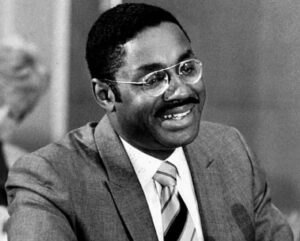Marcus Foster, the revered superintendent of Oakland Unified in the early 1970s, has been a role model for generations of educators inspired by his courage, vision and passion for helping even the most marginalized students succeed.
But there was one thing he was especially good at.
“He could connect people who have money with people who don’t,” said Denise Saddler, an Oakland Unified principal whose family was close friends with the Fosters. “That money allowed teachers and students to be creative and see the possibilities and implement their dreams.”
Foster, one of the first Black superintendents of a large U.S. school district, was assassinated by an extremist political group 50 years ago as he was leaving a school board meeting.
Just two months before he died, he used his gift for fundraising to create the nation’s first education foundation — a model that now exists in 2,500 districts nationwide and raises millions annually.
Education foundations typically raise money from businesses and the community to benefit local schools. Unlike PTAs, they usually operate on a district level, have a broader scope and reach a much larger group of donors.
They fund initiatives like college scholarships, after-school programs, art and music classes, field trips and professional development for teachers — programs that districts sometimes can’t afford.
“It’s difficult to quantify the impact, but education foundations give regular people an opportunity to be stakeholders in schools, which is the best thing you can do for a community,” said Traci Skalberg, board president of the National Association of Education Foundations. “For businesses, foundations create a pathway to invest in education, to build up a future workforce and lift up a whole community. It’s an investment with a ten-fold return.”
Most education foundations are 501(c)3 nonprofits, allowing donors to deduct contributions from their taxable income.

In Oakland, the foundation helped pay for innovative programs that were decades ahead of their time. Among them: a project in which students built a house in West Oakland, and a coffee kiosk at the Oakland airport operated by students at Castlemont High School. It also funded an after-school program called Kids House, which became a model for government-funded after-school programs.
Now, the foundation that Foster started is celebrating his legacy by reissuing his 1970 book, “Making Schools Work,” and promoting his ideals in Oakland and beyond. In addition to the education foundation, Foster was among the first education leaders to champion numerous ideas that in some districts are now commonplace:
- Including the community, students, teachers and parents in the principal hiring process.
- Issuing student identification cards.
- Giving teachers time and funds to implement their own projects. As Saddler put it, “He believed that people closest to the work have the best ideas.”
Foster was hired in Oakland in 1970 after a successful tenure as a teacher, principal and associate superintendent in Philadelphia. When he arrived in Oakland, he delivered a memorable, inspirational speech at the civic auditorium that won over teachers, parents and the community.
“There is in Oakland a fresh wind stirring,” he said in a clear oratorical flourish. “Oakland’s time is now. Our time, our season, our opportunity to seize the main chance, to write a new chapter in the history of American education.”
Among those inspired by Foster’s vision is Kyla Johnson-Trammell, Oakland’s current superintendent. A third-generation Oakland resident, she said she’s long been familiar with Foster’s legacy.
“His vision and commitment to making schools work, not just for students, but for the communities they exist within, serve as the foundational frame for Oakland Unified’s sector-leading work with building and sustaining full-service community schools,” she said.
“The future of education is today, yet Dr. Foster’s lessons of the past remain salient for the perspective and leadership required to solve complex system challenges of tomorrow.”
Foster was shot to death and his deputy injured by members of the Symbionese Liberation Army in November 1973. According to “American Heiress” by Jeffrey Toobin, the SLA had objected to Foster’s attempt to make schools safer by hiring security guards. Three months after the Foster assassination, the SLA kidnapped Patty Hearst, granddaughter of William Randolph Hearst, and continued on a spree of bombings, bank robberies, and other violent acts until six group members died in a shootout with Los Angeles police in 1974. Two SLA members were convicted in Foster’s slaying, although an appeals court later overturned the conviction of one. Joseph Remiro is serving a life sentence at Pelican Bay.
The Oakland Educational Institute later changed its name to the Marcus Foster Education Institute, and has, over the years, given out more than $9 million in scholarships to nearly 6,000 students. It’s also launched numerous other initiatives, including a program that encourages Oakland Unified students to apply for financial aid. Working with other nonprofits and the local community colleges, the foundation led an effort to streamline and organize the district’s financial aid application process. In just over 10 years, the program has increased the rate of students applying for college aid from 40% to nearly 70%.
But while the money is important, it’s not the only factor in students’ success, said Alicia Dixon, the foundation’s executive director.

“We don’t just throw cash at students and say, ‘Off you go,’” Dixon said. “We continue our relationship with students even after we’ve given them scholarships. We’re taking the message of Marcus Foster and pushing it forward.”
Avery Waddell, 24, is one of the students who has benefited from that relationship. As a high school senior in 2017, he won a Marcus Foster scholarship to attend Southern University, a historically Black college in Baton Rouge, Louisiana. The summer before he left, he took part in the foundation’s Reset program, in which scholarship winners brainstorm ideas to benefit the community.
He and his cohort decided to focus on youth mental health. They came up with a plan to test students for anxiety and depression and bring in a panel of experts to offer tips and resources. Waddell himself had suffered from anxiety in high school, and he was so inspired by the Reset project that he changed his major from biology to psychology.
He kept in touch with his Reset peers and the foundation staff, and after he graduated with honors in 2021, the foundation hired him to work in its human resources department. Since then, he’s merged his interest in psychology with his HR experience to pursue organizational and industrial psychology. He’s now applying for master’s programs.
“The Marcus Foster Institute gave me these experiences,” he said. “The scholarship money was helpful, but it was these other opportunities that really changed my life. The enrichment, the networking, the ‘soft skills’ — you can’t put a price on that.”
It’s stories like Waddell’s that best exemplify Foster’s legacy, Saddler said. Although he was brilliant at raising money, Foster also knew the importance of personal relationships, not just with students but with teachers, as well.
“He’d look at the issues and needs and give people the opportunity to be creative and solve problems,” said Saddler, who sits on the foundation board. “He made people feel special.”
